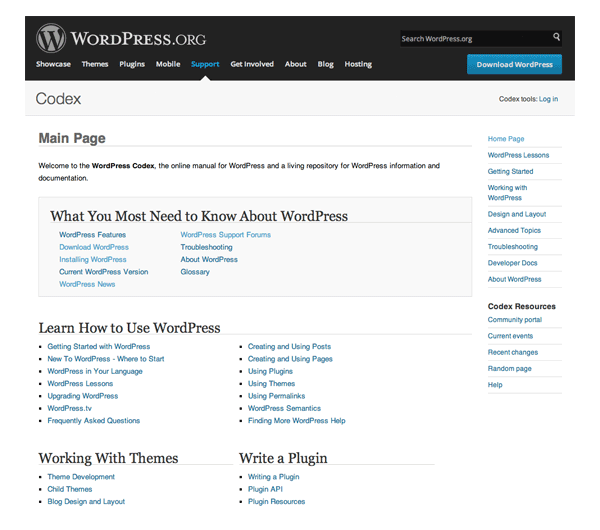[ad_1]
A few weeks ago I spoke about where you could find help online when you have a WordPress related problem. One of the resources that was included in the list was the WordPress Codex.
The WordPress Codex is an official online manual from the developers of WordPress. It is a big resource that details every template tag and every function that WordPress uses. It also links to useful tutorials and plugins.
The WordPress Codex contains a lot of information on how to use and develop WordPress.
Today, I would like to show you what the codex has to offer and how you can use it to improve your knowledge of WordPress.
Important Sections
I have relied on the codex a lot over the years. Sometimes I find what I am looking for right away. Other times I struggle to find the information I need.
There is a structure (of sorts) to the information published in the codex. However, there is so much content in the directory that it can be difficult to find what you need. This is because it is not practical to display all pages within the codex on the main page. The page you are looking for may only be reached via one or two other sub pages.
If you are finding it hard to find a solution to a problem, use the search box at the top of each page to narrow down your search.
Below is a list of what I consider to be the most relevant sections in the codex.
Installing WordPress & Updating WordPress
The installation and updating guides are essential for those who are installing WordPress for the first time.
The installation guide can be a little technical. It assumes that you already know how to upload files and create a database. If you find the guide difficult to follow, I recommend reading our WordPress installation guide.
The first steps article gives a short walkthrough on what you do when you first login to WordPress. Beginners will find this article useful after installing WordPress for the first time.
The WordPress lessons area lists dozens of tutorials for beginners and theme developers. It is a useful place if you want to start learning how to get the most from the WordPress platform.
The WordPress glossary contains information on nearly one hundred and fifty terms. If you ever hear a word used about WordPress that you do not understand, jump to the glossary to see a definition.
If you are unsure about how to use WordPress, or if you are dealing with errors or spam, check out the troubleshooting guide. It links to many useful articles about running your website efficiently
The theme development page covers every aspect of creating a WordPress theme. It highlights key concepts such as child themes, template tags, and the WordPress template hierarchy.
The plugin development page gives information for developers on how to start developing a WordPress plugin. It refers to important articles such as WordPress Coding Standards and the WordPress Plugin API.
How to Use the Codex to Improve Your Knowledge of WordPress
As a reference, the codex has everything you need to improve your programming skills and your overall knowledge of WordPress.
The best way to learn is by application. Obviously, you should not be using a live website to try things out. That is a recipe for disaster. Instead, install WordPress in a sub directory or in an unused domain name and use it exclusively for testing.
That is how I improved my WordPress knowledge over the years. I use my test website to test new plugins and themes. I also use it to test new functions and template tags that are new to me.
I encourage you all to create a test website and start tinkering around with theming. Break things, see what works, see what doesn’t. You will be surprised at how quickly you can learn by doing this.
The Codex is Not Perfect
I refer to the WordPress codex regularly, though there is no hiding the fact that it needs to be improved. There are a lot of articles that continue to refer to external tutorials and plugins that are four or fives years out of date.
While the codex is a useful reference, it is not the most user-friendly manual. Most articles are written in a technical manner, which can make it difficult follow tutorials on new subjects. I find the structure of content to be a little chaotic at times too. For example, learning how to modify a theme template usually means checking several template tag and function pages.
Tom McFarlin noted that whenever he tries to refer someone to the codex, they respond “Please don’t suggest the Codex”. Many people share this view. The codex has a reputation of being disorganised, however I am still a big fan. There is a wealth of knowledge in the codex. You just need to know where to look.
Please visit the WordPress Codex to find out more. As always, I would love to hear your view on the codex, so please take the time to leave a comment below.
Article thumbnail image by venimo / shutterstock.com
[ad_2]
Source link

